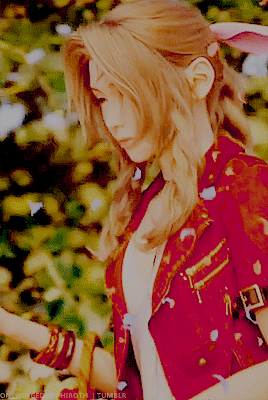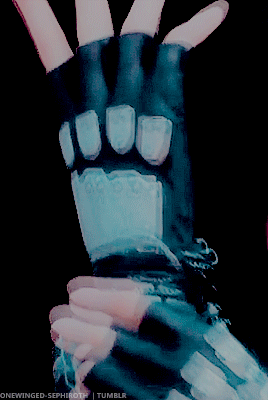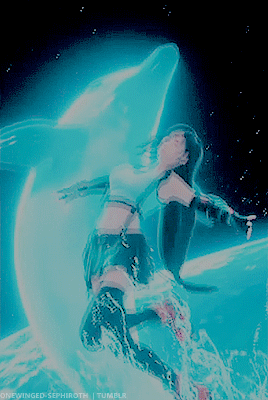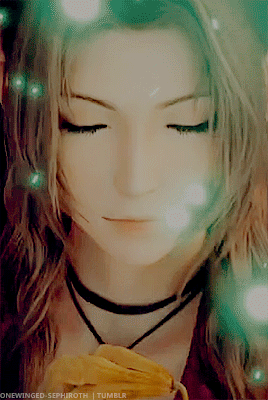Full Image, Baby Soldiers Having A Snooze. For The Friends Who Don't Use X ^^

Full image, baby soldiers having a snooze. For the friends who don't use X ^^
More Posts from Terra-fatalis and Others




AERITH & TIFA CG IN BRAVE EXVIUS








AERITH PLAY ARTS KAI RED DRESS
Aerith, from FINAL FANTASY VII REMAKE, makes her appearance in the PLAY ARTS KAI action figure line, clad in her extravagant red dress from the Wall Market section of the game!
The Unifying Theme of FFVII
So I recently got an ask that was very interesting and which I think I did a piss poor job answering. Republished here:
what is the biggest theme of FF7 that ties every character together to you? life? pro environmentalism? identity? connections?
My answer was, in a nutshell, "existentialism." It's broadly true, and was certainly an influence on the game (see: Martin Heidegger, Existentialist philosopher and known bastard) but it's a reductive and Western take overall.
So, here's the long version, and a disclaimer up-front that I'm a simple Western weeb doing internet research to the best of my ability; apologies to those who know more than me.
Square has always stated that the theme of the game is "life". This is wholly accurate, but comes off as a little twee to a Western ear. This is because "life" is a translation of the Japanese word "inochi" (命). It is a broader, more holistic concept than the English "life," with different nuances and connotations.
For a longer and much more informed read on inochi specifically, see The Concept of Life in Contemporary Japan by Masahiro Morioka. Otherwise, keep reading after the cut!
In addition to meaning life or lifespan, "inochi" also encompasses the idea of a "spirit" or vital force. It extends beyond referring to life in the general sense. Much like any one person's mind, spirit, and lived existence isn't interchangeable with anyone else's, one's "inochi" is unique and individualistic.
This concept extends beyond just human life. Animals, mountains, rivers, and trees all have "inochi" too. An illuminating quote From Aspects of Shinto in Japanese Communication by Kazuya Hara (and his primary source):
From the viewpoint of Shinto, nature itself is seen to have a spirit and life. For example, Japanese people have looked upon even a tree, a rock, or a river in nature as a figure of life. Kamata (2000) argues that the Japanese word inochi connotes the dynamic motion, flow, and circulation of all the universe.
That circulation also includes the idea that "inochi" does not refer to only a single individual life, but a chain of all the lives that have gone before. It encompasses the fleeting and finite life of the individual as well as the ecosystem in which they lived, and the influence and impact which will survive them and create the next link in the chain.
You'll recognize many of these concepts as being expressed through the Lifestream, and extant in the environmentalist elements of the game. Navigating the apparent paradox of a finite and infinite "inochi" also pulls our cast in, all of whom are characters struggling with their individual existence in the context of a greater, deeply interconnected crisis.
"Inochi" is also connected to FFVII's strong themes of navigating identity and uncovering the fundamental self. The word can also be used to refer to the core or fundamental part of something, its "most essential quality." This echoes Cloud's journey to rediscover himself, and it's noteworthy that he find again within the Lifestream, the manifestation of "inochi" itself.
"Inochi" is definitely a very accurate unifying theme. We've touched on how that connects to Shinto themes, but Buddhist philosophies of life and existence are just as culturally prevalent in Japan and influential on the themes of VII in turn. So, let's talk about Buddhism, with another disclaimer that I'm not expert by any means whatsoever.
A foundational concept in Buddhism is the Three Marks of Existence: Impermanence, the non-self, and suffering. We'll mainly focus on the first two.
The first, impermanence, is as it says on the tin. According to Buddhist thought, impermanence is inherent to the natural world, and failing to recognize this will bring suffering. The bad passes along with the good, the big as well as the small. The strain of Buddhist thought through the game is part of why FFVII's original ending is so appropriate, and Aeris' death so integral to the rest of its themes.
The second is the non-self. Related to the concept of impermanence, the idea here is that there is no permanent incarnation of the self, and there is no way to separate the self as an individual from its myriad pieces and its context. From What Are The Three Marks of Existence by Dana Nourie:
When you start to see how you aren’t a solid, unchanging self, but a impermanent, dynamic person, you also loosen your clinging to thoughts, ideas, emotions, and the idea of a “real you”.
The connection to Cloud's personal journey throughout the game is obvious - an abundance of attachment to an artificial self causes him to suffer until he is able to reconcile it and let it go. Sephiroth, meanwhile, faces a similar challenge to his own identity and slips sideways into Nihilism, unable to overcome (or even admit) his own suffering.
There's a connection between Buddhist and Existentialist/Existential Nihilist thought. While Buddhism incorporates the concept of suffering as an inherent and endless facet of life until nirvana can be reached, Existentialists struggle with a post-modern feeling of dread or anxiety fundamental to living in a meaningless and chaotic world. There's also been plenty of cultural exchange between eastern and western concepts here - Heidegger is one notable participant.
Another is Keiji Nishitani from the influential Kyoto University of Philosophy. Engaging with western Existentialist thinkers, he wrote Religion and Nothingness on the connection between the concept of the non-self and the western philosophy of Nihilism. He compared the similarities between the two, while ultimately refuting Nietzche's perspective. This quote (helpfully, from his Wikipedia page) seems particularly instructive, especially in returning back to some of the initial concepts expressed by "inochi":
"All things that are in the world are linked together, one way or the other. Not a single thing comes into being without some relationship to every other thing."
My original answer to this question was Existentialism because there simply isn't a word or a tidy concept in my vocabulary that can convey all of this disparate information. Existentialism seemed to me like the most familiar and broad concept to encompass these themes, always in the form of questions: How do we live? How do we separate subjectivity from objective truth? How do we preserve the sense that our lives are meaningful?
You must decide for yourself; you must remember your connections to other lives; you must let go.
Crisis Core Transcripts
The long awaited (??? by me) master post of links to the Crisis Core (2007) transcripts. This bs was typed up by hand by yours truly because SOMEONE made UMDs very difficult to rip (<3 u SONY).
Link to gdrive folders hosting transcript documents.
Link to my fancy dedicated tumblr page for this nonsense because I can't not go overboard?? (it is maybe a convenient place to bookmark)
Check below the fold for direct links to specific content.
Complete Transcript ( Abridged / Unabridged )
00. Prologue
01. Embrace Your Dreams ( Abridged / Unabridged )
02. Betrayal ( Abridged / Unabridged )
03. Monster ( Abridged / Unabridged )
04. An Angel's Dream ( Abridged / Unabridged )
05. Where Are You? ( Abridged / Unabridged )
06. Protect Your Honor ( Abridged / Unabridged )
07. Departure ( Abridged / Unabridged )
08. See You Soon ( Abridged / Unabridged )
09. Escape the Nightmare ( Abridged / Unabridged )
10. Heroes ( Abridged / Unabridged )
Credits
DMW Scenes
Yuffie Missions
Other Missions

Zack and Aerith from Final Fantasy VII Ever Crisis
I want to express just a quick and superficial thought about the impact of Zack on SOLDIER-Cloud's personality since I've recently had a discussion about it.
Some months ago I stated that in this scene (not only here btw)...

... Cloud is mimicking Zack's attitude.
The person I was discussing with mentioned the quote from the Ultimania according to which "Cloud puts up a cool facade with Aerith and shows his real self when he's with Tifa", so what I had written had to be nothing but a great nonsense. Probably they thought I was trying to invalidate any romance between Cloud and Tifa in favour of Aerith, even if it would be a total contradiction since the fiercest CA fans spent more than two decades trying to loosen the connection between Zack and SOLDIER-Cloud... But I wouldn't be surprised to hear these kind of theories since the upcoming Ultimania Plus is seemingly going to show the same concept...
ANYWAY, no time for digressions.
I'd like to add a comparison with one of Cloud's DMW sequences from Crisis Core





I think it's hard not to notice the similarity with Tifa's resolution and the scene in Cloud's room in Chapter 4



But let it be clear, this doesn't mean - and I've never meant to say it - that Cloud is acting through Zack's intentions. As long as the devs don't provide further info, all we know is that Cloud didn't inherit Zack's memories, let alone his feelings. If so probably he would be much more devoted to Aerith.
Zack knew Cloud liked Tifa, he would have never flirted with her. Never.
Cloud's always been socially awkward, insecure, uncapable to approach Tifa in any way. Now I don't want to go too much into SOLDIER-Cloud's convoluted personality but he acts through his own intentions - confused intentions at this point of the story, but still his own. Only the way he expresses himself mimics Zack's.
That quote from the developers says that "when he talks to Tifa his real self briefly emerges". BRIEFLY. Stating that Cloud with Tifa is always his real self goes totally against this story and the dynamics behind the creation of his alter ego. His feelings for her are sealed deep into his subconscious, Cloud himself says "I don't know how to explain" when he's asked about what Tifa means for him.
That line has to be contextualized to make sense. I think this concept just shows something that was already in the OG: the player could choose to be rude with Aerith, even during her date (probably to show his conflicted feelings), but never with Tifa, he's always been istinctively soft with her. He gets jealous, he lets her into his personal space, he touches her and lets her touch him, and when they're in dangerous situations he's istinctively protective.

And not because Tifa is better than Aerith but because real-Cloud's character arc revolves around Tifa, like it or not. There's no need to twist a simple line from the devs nor to diminish the impact of Zack on SOLDIER-Cloud to prove it.
With the voice recordings underway, what do y’all think part 3 of the FF7 Remake trilogy will be called???

responsible adults
-
 sleepyaurora liked this · 1 week ago
sleepyaurora liked this · 1 week ago -
 my-arms-are-noodles liked this · 1 week ago
my-arms-are-noodles liked this · 1 week ago -
 ccy404 liked this · 1 week ago
ccy404 liked this · 1 week ago -
 for-getme-not liked this · 1 week ago
for-getme-not liked this · 1 week ago -
 silvandar liked this · 1 week ago
silvandar liked this · 1 week ago -
 bjdavis5 reblogged this · 1 week ago
bjdavis5 reblogged this · 1 week ago -
 bjdavis5 liked this · 1 week ago
bjdavis5 liked this · 1 week ago -
 paperbackrider liked this · 1 week ago
paperbackrider liked this · 1 week ago -
 spookergummy liked this · 1 week ago
spookergummy liked this · 1 week ago -
 iwanaknow liked this · 1 week ago
iwanaknow liked this · 1 week ago -
 britelite2150 liked this · 1 week ago
britelite2150 liked this · 1 week ago -
 moondia-art liked this · 1 week ago
moondia-art liked this · 1 week ago -
 rowenwolf liked this · 1 week ago
rowenwolf liked this · 1 week ago -
 canieatyourface liked this · 1 week ago
canieatyourface liked this · 1 week ago -
 noebg08 liked this · 1 week ago
noebg08 liked this · 1 week ago -
 obsessivefangirlfeels liked this · 1 week ago
obsessivefangirlfeels liked this · 1 week ago -
 iamryxx liked this · 1 week ago
iamryxx liked this · 1 week ago -
 amadeoderomanus2 reblogged this · 1 week ago
amadeoderomanus2 reblogged this · 1 week ago -
 kaumaridevi liked this · 1 week ago
kaumaridevi liked this · 1 week ago -
 akoiobi liked this · 1 week ago
akoiobi liked this · 1 week ago -
 dying-moonlight reblogged this · 1 week ago
dying-moonlight reblogged this · 1 week ago -
 dying-moonlight liked this · 1 week ago
dying-moonlight liked this · 1 week ago -
 i-am-doing-my-best-orz liked this · 1 week ago
i-am-doing-my-best-orz liked this · 1 week ago -
 pulseminus liked this · 1 week ago
pulseminus liked this · 1 week ago -
 mooon-dusts liked this · 1 week ago
mooon-dusts liked this · 1 week ago -
 dethallim liked this · 1 week ago
dethallim liked this · 1 week ago -
 bina-a-k liked this · 1 week ago
bina-a-k liked this · 1 week ago -
 happyancientdog liked this · 1 week ago
happyancientdog liked this · 1 week ago -
 cicimellie liked this · 1 week ago
cicimellie liked this · 1 week ago -
 kiataika liked this · 1 week ago
kiataika liked this · 1 week ago -
 spectacled-chocobo reblogged this · 1 week ago
spectacled-chocobo reblogged this · 1 week ago -
 tarudce22 reblogged this · 1 week ago
tarudce22 reblogged this · 1 week ago -
 tarudce22 liked this · 1 week ago
tarudce22 liked this · 1 week ago -
 katblack42 liked this · 1 week ago
katblack42 liked this · 1 week ago -
 crowmakeska-boom liked this · 1 week ago
crowmakeska-boom liked this · 1 week ago -
 theblackwolf21 liked this · 1 week ago
theblackwolf21 liked this · 1 week ago -
 theblackwolf21 reblogged this · 1 week ago
theblackwolf21 reblogged this · 1 week ago -
 kibonotora liked this · 1 week ago
kibonotora liked this · 1 week ago -
 thereisselfpreservation reblogged this · 1 week ago
thereisselfpreservation reblogged this · 1 week ago -
 skywalkerbee reblogged this · 1 week ago
skywalkerbee reblogged this · 1 week ago -
 shiki-art-corp reblogged this · 1 week ago
shiki-art-corp reblogged this · 1 week ago -
 insertsomthinawesome liked this · 2 weeks ago
insertsomthinawesome liked this · 2 weeks ago -
 flaming-flamimgos liked this · 2 weeks ago
flaming-flamimgos liked this · 2 weeks ago -
 zacksfairest reblogged this · 2 weeks ago
zacksfairest reblogged this · 2 weeks ago -
 endlessbluesky liked this · 2 weeks ago
endlessbluesky liked this · 2 weeks ago -
 kamokachan liked this · 2 weeks ago
kamokachan liked this · 2 weeks ago -
 poorly-disguised-apple liked this · 2 weeks ago
poorly-disguised-apple liked this · 2 weeks ago -
 jupiter-juu liked this · 2 weeks ago
jupiter-juu liked this · 2 weeks ago -
 iamarealperson1234 liked this · 2 weeks ago
iamarealperson1234 liked this · 2 weeks ago -
 thequeenoffuckoffimsleeping liked this · 2 weeks ago
thequeenoffuckoffimsleeping liked this · 2 weeks ago

Hardcore FFVII fan sharing theories & fanart, sometimes silly stuff ⋆ AuDHD ⋆ She/her ⋆ INTP ⋆ Atheist ⋆ Non-native English speaker, be merciful with my odd way of writing ⋆ Twitter @TerraFatalis
234 posts



